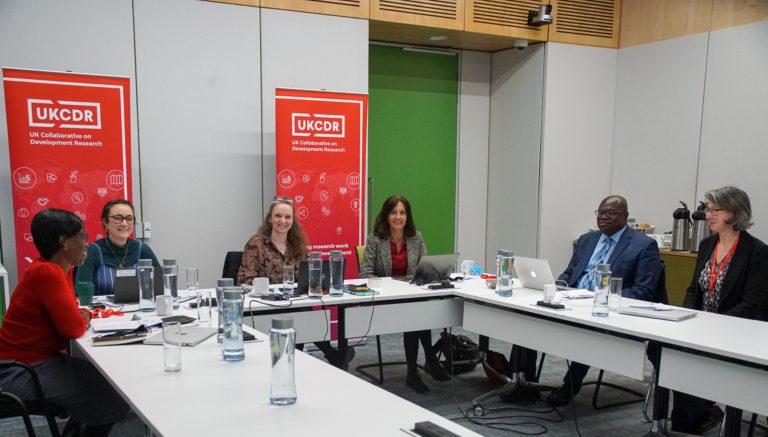‘Looking to the long-term: sustainable research partnerships between LMICs and the UK’
Lucy Lawrenson
Last week, 10th March 2022, the UKCDR team was pleased to host seven remarkable speakers in our Euston office and 200 audience members virtually. The panel, including several members of the Strategic Coherence of ODA-funded Research (SCOR) Board, came together to discuss barriers and approaches to equity in global development research partnerships between low-and middle-income countries and the UK.
Our esteemed speakers:
- Dr Maggy Heintz- Executive Director, UKCDR
- Marie Staunton, CBE – SCOR Board Chair
- Prof Charlotte Watts – Chief Scientific Advisor, FCDO
- Mavis Owusu-Gyamfi – Executive Vice-President, African Center for Economic Transformation
- Prof Ernest Aryeetey – Secretary-General, African Research Universities Alliance
- Prof Dajana Dzanovic – Head of Strategic Partnerships, Universities UK international
- Prof Melissa Leach – Director, Institute of Development Studies
- Alice Chadwick El-Ali – Senior Research and Policy Officer, UKCDR
Honoured to be presenting with such an eminent group of speakers. Thank you for the invite @UKCDR and look forward to the event next week! @UUKIntl https://t.co/ONhiia6s5K
— Dajana Dzanovic (@dajdz) March 1, 2022
We have such a great line up of speakers this Thursday!
— UKCDR (@UKCDR) March 8, 2022
Looking forward to hearing @dajdz @UUKIntl thoughts on how 🇬🇧UK Universities are approaching 🌍global research partnerships.@UKCDR Event 10 March
9:30-11:30am GMT
Don't forget to register👉 https://t.co/8RKCYRWP3U
The event opened with introductory remarks from our Executive Director, Dr Maggy Heintz, followed by a virtual keynote address from SCOR Chair, Marie Staunton CBE, who set the scene for the day’s discussion.

Session One: the importance of science, technology and research to development agendas
Prof Charlotte Watts opened Session One by discussing

ambitions for UK ODA-funded research from now until 2025, providing a sense of the overall UK policy and funding landscape. Mavis Owusu-Gyamfi then illuminated the role of research and technology in supporting the development agenda of African governments through an economic lens. The session closed with a lively Q&A in which attendees got to pose questions to our two panelists.
❗️@UKCDR define equitable partnerships as mutual participation + mutual responsibility + mutual benefits, with equal value placed on each partner’s contribution.
— FCDO Research (@FCDOResearch) March 10, 2022
Look at their #EquitablePartnerships Resource Hub & get in touch if you have additions: ▶️https://t.co/9qfI2B0j6p https://t.co/D16LJ40QWg
ref_src=twsrc%5Etfw%7Ctwcamp%5Etweetembed%7Ctwterm%5E1501913796583079939%7Ctwgr%5Ef1efcfa21b852db470bc3b95820cef29097189a2%7Ctwcon%5Es1_&ref_url=https%3A%2F%2Fwww.ukcdr.org.uk%2Fmoments-from-ukcdrs-annual-stakeholder-event-looking-to-the-long-term-sustainable-research-partnerships-between-lmics-and-the-uk%2F
"Across Africa there are a number of science, technology and research strategies – the challenge now is in the implementation"@MOGinAfrica @AcetforAfrica#UKResearch4Dev #EquitablePartnerships
— UKCDR (@UKCDR) March 10, 2022
Session Two: global academic partnerships

Prof Ernest Aryeetey kicked off Session Two by reflecting on how African universities think of and approach international research partnerships, with an emphasis on how this has changed in recent years, especially in light of Black Lives Matter. These reflections were complimented by Prof Dajana Dzanovic’s presentation, ‘UK Universities and Global Research Partnerships’, which discussed how universities and funders can balance between the necessary admin and equity.
Complex economic, social and development challenges cannot be addressed by countries and institutions working in isolation.
— UKCDR (@UKCDR) March 10, 2022
Funders have a central role in shaping partnerships with shared goals that place people and the planet at their centre.@ProfEAryeetey @ARUA_News
"Funding stability is a critical characteristic of ODA R&D funding.”
— UKCDR (@UKCDR) March 10, 2022
A lack of funding stability can negatively affect the trust that has been built between partners.@dajdz @UUKIntl @UniversitiesUK#UKResearch4Dev #EquitablePartnerships
Session Three: demonstrating impact – how we can work together
Session Three was led by our final external speaker, Prof Melissa Leach, who highlighted different definitions of research impact and the importance of working together. In particular, Melissa emphasized the need for transdisciplinarity and co-construction to improve impact.
Ernest, Dajana and Melissa then answered questions from attendees, and we heard from an audience member, Mark Woolhouse, about his observations on issues of equity in co-authorship between UK and LMIC researchers.

"For many complex problems, there will be multiple pathways to change that suits different people and different groups."
— UKCDR (@UKCDR) March 10, 2022
To achieve impact and change, research should be prepared to challenge dominant narratives and bring to light others. @mleach_ids @IDS_UK#UKResearch4Dev
Proud to see an @RAEngGlobal programme shown as examples of good practice by @MOGinAfrica at the @UKCDR event.
— Meredith (@MeredithEtt) March 10, 2022
Find out more about the Enriching Engineering Education Programme (now HEP SSA) from the people involved here: https://t.co/HHG74Mwt31 pic.twitter.com/eA2kF8cDNL
Throughout the event, audience members used the live poll to tell us what they thought was the biggest barrier to equitable partnerships. As we drew to a close, Maggy shared the poll results with the audience.
34% of the audience agreed that a lack of awareness and understanding of LMIC contexts and constraints represented the biggest remaining barrier.
At yesterdays @UKCDR Stakeholder Event we asked our audience what they thought was the biggest remaining barrier to #EquitablePartnerships. Check out the results!
— UKCDR (@UKCDR) March 11, 2022
👇👇👇
Do you agree? What are other barriers?
Let us know in the comments#UKResearch4Dev pic.twitter.com/eO0O8yK8dR
UKCDR is proud to have a sustained focus on equitable partnerships and research capacity strengthening. In closing, our Senior Research and Policy Officer, Alice Chadwick El-Ali, demonstrated how UKCDR has taken this work forward in recent years and how we continue to advocate for equitable partnerships across our projects, including guidance from UKCDR and ESSENCE on moving from principles to practice coming out in May this year.
A huge thanks to everyone who attended our event, our moderator Dr Maggie Heintz, and each of our esteemed speakers.

And don’t worry – if you didn’t get the chance to join us, you can watch the event recording on our website! Use the passcode: =%vUT%4N